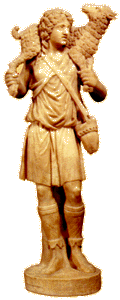
The Roman Dacians' Christianization

Terms of pagan Latin origin
"Biserica" (in English, "church"), is a derivative from the Latin word "basilica" that comes from the Greek term of "basilich
". By this, the Romans meant a building where a kind of court of law made justice in the name of the emperor. When Constantine the Great granted liberty for Christianity in 313, he gave
the Christians the buildings of the old courts of law , the basilicas , because they didn't want to worship God in the former pagan temples7. Although in the age of Constantine the Great the worship
houses built were known as "basilicas"8, in time this notion extended to the whole Christian community. This word entered in Dacia in the 4th century from the Roman provinces on the southern bank of the Danube. "Dumnezeu" (in English, "God"), comes from the Latin term "Domine Deus" - in an old popular form without the "i":
"Domne Deus" is an old pagan invocation. "Duminica" (in English, "Sunday"), comes from "dies dominica", term that
replaced the weekly pagan celebration "dies solis" - the Sun's Day. "Craciun" (in English, "Christmas") , does not have
a clear etymology. Some researchers support the idea that it comes from the Latin word "calatio, (ac. calationem)". By "calatio", the Romans meant the convocation of the people by the pagan
priests on every first day of the month when the celebration that were about to come were announced. Before the end of the 4th century the Birth of the Son of God
was celebrated along with the Baptism on 6th January. Now almost all theologists think that "Craciun" comes from "creatio" (ac.-creationem; in vulgar Latin: "creation", "
creatiun"); the word means the day of the "creation" of God. "Colinda" (in English , "carol" or "song") has its origins in
the vulgar Latin word "colendae" or "calendae" - the first day of a month. Kalendae Januarii (the 1st
of January) were celebrated with songs, good-wishes, congratulations and parties. The Christians transformed and adapted them to the Christian religion. "Pasti
" (in English, "Easter") is the plural from "pascha" (Easter cake); the word was taken by the Romans from the Hebrew term "pesa'h". "Rusaliile
" (in English , "Whitsuntide") comes from the old Roman celebration "Rosalia", a day of prayers for the dead, that was held in spring when the roses ("rosa") blossom. And because
Pentacost was celebrated at the same period, it received the name of the pagan festivity of "Rosalia"9. "Floriile
" (in English , "Palm Sunday") comes from "Floralia" or "Florilia" in vulgar Latin. This was the celebration of the goddess Flora, the goddess of flowers, a festivity that was very close in date
with the one of "The Entering of the Savior in Jerusalem". The term also appears as "Duminica florilor" ( the Flowers' Sunday). "Sarbatoare
" (in English, "celebration" or "festivity") has its origins in "dies servatoria", a day dedicated to the gods that protected the people (in Latin, "servo,-are" - to protect, to
hold).The cult of the conservatory gods maintained itself in Christianity under the form of the cult of the saints and the martyrs10. "Lege
" (in English, "law") is a derivative of the Latin word "lex,-egis" (ac. "legem"). In the old times this term was mistaken with the one of religion, faith: for the Romanian peasant "the
Romanian law" was synonymous to " the orthodox law"11. "Mormant" (in English, "grave") comes from "monmentum" that was
transformed in "monimentum" or "morimentum" as the funeral inscriptions in the Roman catacombs certify.
7 As Saint Luca says, the first Christians made their prayers and the division of the bread in a chamber in private houses. In time, special chambers were built for this.
8 The basic Romanian Christian terminology is different from the western one the term of "basilica": was adopted and in the west the Latin term "ecclesia". is encountered 9
Other Romance nations use for this notion derivatives from "penthcost", in French "Pentecôte", in Italian
"Pentecoste" and in English "Pentecost". 10
In the west, for celebration there are used derivative words from "festum", in French "fête", in Italian "festa" and in English "festivity". 11
In the west, derivative words from "fides", in French "foi" and in Italian "fede".


